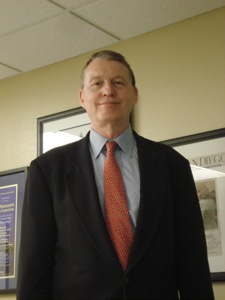-
- Episcopal Diocese sues to seize property from bishop
- Same-sex couples hit obstacles obtaining divorces
- Federal appeals court overturns discrimination verdict
- Commission stops short of recommending same-sex marriage
- Democrats eye bill to protect gays
- Polk County files response in same sex marriage case
- National News Briefs
- World News Briefs
san diego
Campaign to repeal ‘Don’t Ask, Don’t Tell’ launches from San Diego
Military using more convicted felons
Published Thursday, 01-May-2008 in issue 1062
San Diego marked the beginning of a six-city, whistle-stop tour of communities in the Western United States organized by Servicemembers Legal Defense Network (SLDN) to highlight efforts to repeal “Don’t Ask, Don’t Tell.”
The tour, which began last week, is an initiative aimed at educating Americans on efforts to lift the ban on gay, lesbian and bisexual service personnel.
“We are here to engage San Diegans in the effort to lift the ban on gays in the military. ‘Don’t Ask, Don’t Tell’ results in the loss of thousands of talented, skilled service members our military needs,” said SLDN executive director Aubrey Sarvis, who the tour will take from San Diego to Palm Springs before making stops in Las Vegas, Denver, Boulder and Colorado Springs.
“Change doesn’t come from Washington, it begins with the American people – it starts right here in San Diego. Poll after poll show Americans favor lifting the ban, so we need to turn that support into a call for action that Congress cannot ignore,” Sarvis said.
According to Gary Gates at UCLA’s Williams Institute, San Diego is home to more than 21,000 lesbian and gay military veterans; another 115,000 call California home. An estimated 65,000 lesbian and gay service members serve on active duty and in the reserves of the United States armed forces.
SLDN representatives held a reception to kick-off the tour, which local members along with members from the American Veterans for Equal Rights (AVER) and former members of the military attended.
Among them was David Hall who served five years in the U.S. Air Force.
He says he was kicked out after word got out he’s gay.
“It’s an unfair policy that puts us in bad company,” Hall said. “Look at all the other NATO countries; there are only two, Turkey and the United States that don’t allow gays and lesbians to serve openly.”
Since 1993, more than 12,000 men and women have been dismissed under “Don’t Ask, Don’t Tell,” including 800 with skills deemed “mission critical,” such as pilots, combat engineers, and linguists.
During the past two years, 18 service members from Camp Pendleton and four from Marine Corps Air Station Miramar say they were discharged for being gay.
Additionally, SLDN representatives lobbied local legislators to support HR-1246, the Military Readiness Enhancement Act, which would repeal the law mandating that the U.S. military fire gay and lesbian employees.
Currently HR-1246 has 142 co-sponsors in the U.S. House of Representatives, including San Diego Representatives Susan Davis and Bob Filner.
“Congressmember Davis recognizes the need to sway public opinion in the effort to repeal “Don’t Ask, Don’t Tell.” She has pressed the issue in hearings before the House Armed Services Committee,” Sarvis said,
As Chair of the Military Personnel Subcommittee, Davis plans to hold a hearing this year on the “Don’t Ask, Don’t Tell” policy.
But while some leaders are working to repeal the policy, others oppose the plan and support the ban on gays in the military.
Three local U.S. Representatives – Brian Bilbray, Duncan Hunter and Darrell Issa – are among those who support the ban.
SLDN representatives met with Bilbray over the weekend but said it didn’t seem as if they succeeded.
Bilbray did say that he listens more to the rank and file than he does to the generals.
“That’s good news for us, because the evidence indicates that it doesn’t matter much to the rank and file whether their buddies are gay or straight. It shouldn’t matter to anyone else, either, but it does,” the lobbyists said, noting that opponents of lifting the ban say the policy is crucial in maintaining troop morale and unit cohesion.
According to Zogby International poll results released in 2007, of 545 U.S. troops who served in Iraq and Afghanistan, three-quarters of the troops say they are personally comfortable interacting with gays, with only 5 percent saying they are “very uncomfortable.
Additionally, newly released data show that the Army and the Marine Corps, under pressure to increase their numbers, have sharply raised the number of recruits who have felony convictions.
The information, released Monday by the House Oversight and Government Reform Committee, shows that the number of soldiers admitted to the Army with felony records jumped from 249 in 2006 to 511 in 2007. And the number of Marines with felonies rose from 208 to 350.
The bulk of the crimes involved were burglaries, other thefts, and drug offenses, but nine involved sex crimes and six involved manslaughter or vehicular homicide convictions.
The use of felons to fill the ranks comes as two people every day are dropped from the military for being gay under “Don’t Ask, Don’t Tell.”
A study conducted last year for SLDN concluded that the U.S. military could attract as many as 41,000 new recruits if gays and lesbians in the military were able to be open about their sexual orientation.
|
|
Copyright © 2003-2025 Uptown Publications


